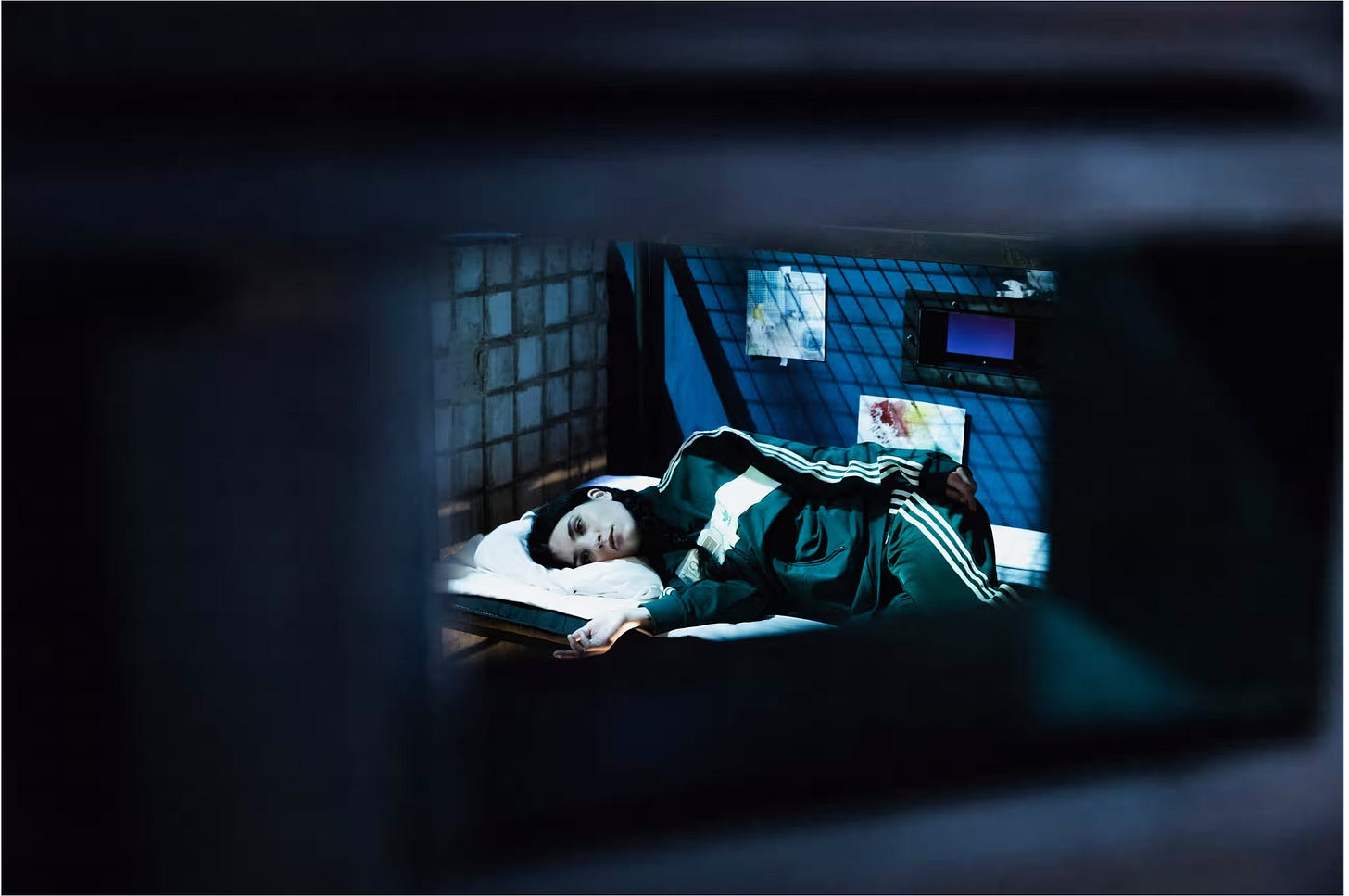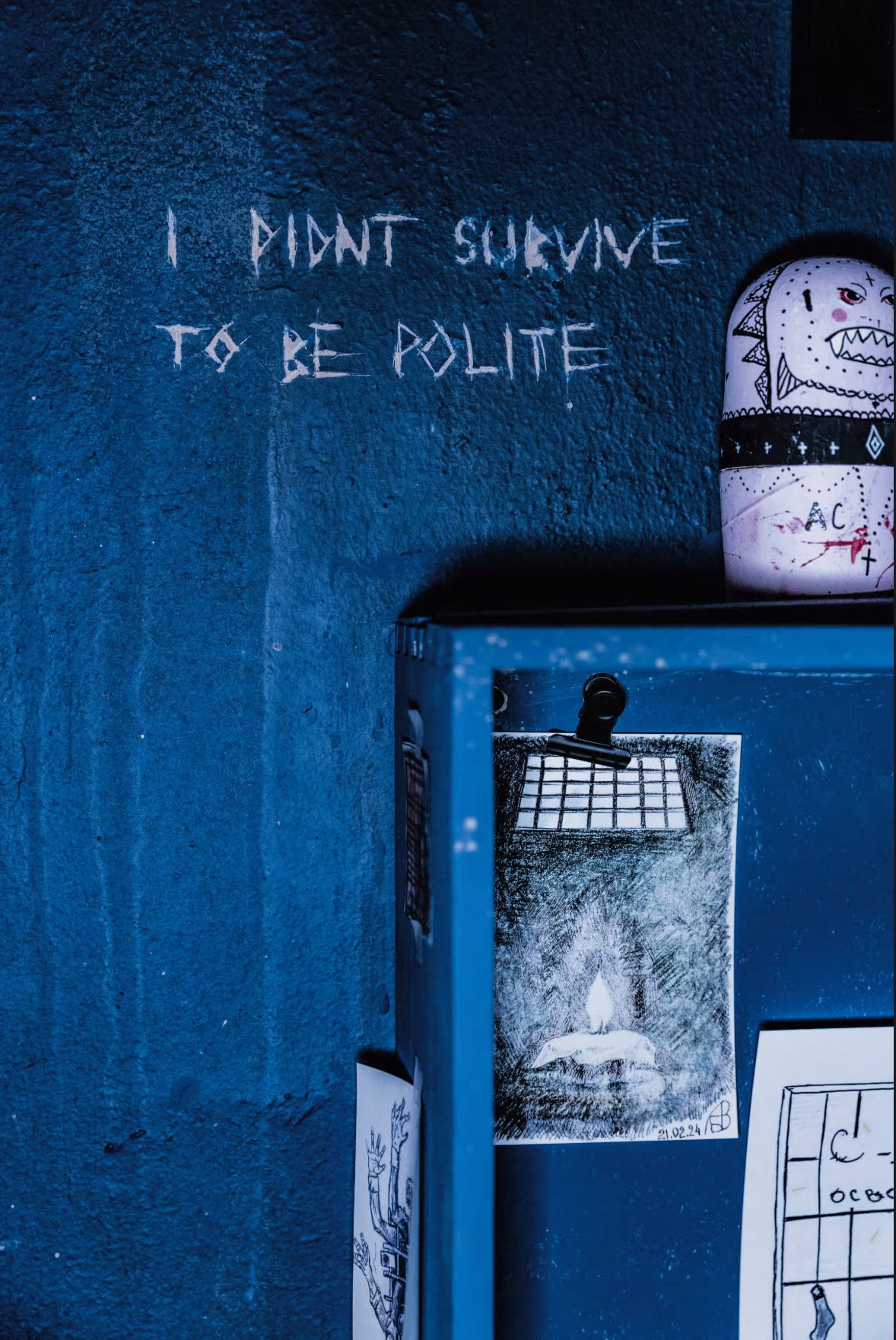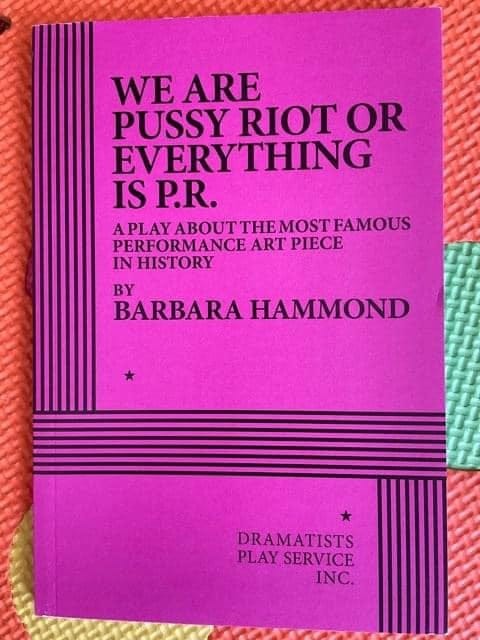Last Sunday, along with twenty other women, I raged, kicked, punched, and stood my ground with Nadya, activist and co-founder of Pussy Riot. The performance was the culmination of Nadya’s new installation POLICE STATE at The Museum of Contemporary Art in Los, Angeles.
I’m in awe of Nadya’s ferocity, humanity, artistry, and resilience. Her art and activism epitomizes how the political is always personal and how powers of persona, performance, and art as activism weave together to become tools for resistance and social change.
Alchemizing pain and creating so much power must come at great personal cost.
I hope our hearts fed hers.
PUSSY RIOT SIBERIA


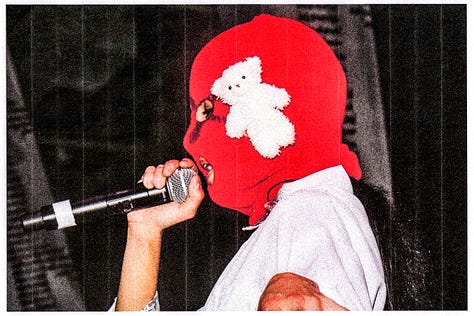


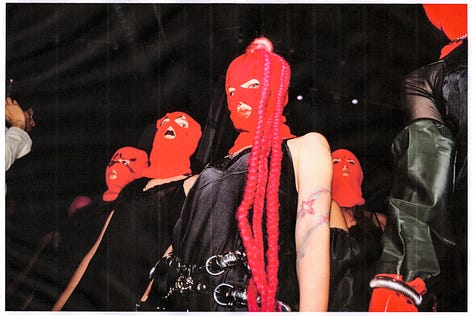
MOCA presented the world premiere of Nadya Tolokonnikova's site-specific performance installation, POLICE STATE —
The performance was planned to occur a week prior. But ironically the installation was briefly shut down due to our very own POLICE STATE that occurred in DTLA when LAPD and the National Guard were sent in to quell protests of ICE raids. MOCA is located directly across from a detention center…
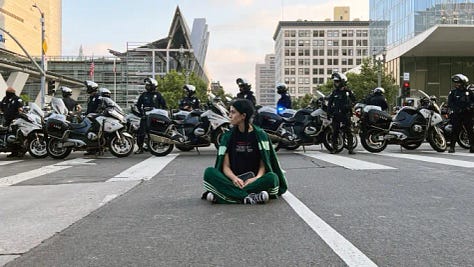


When Russia invaded Ukraine in 2022 I remember seeing CNN interview a young Ukrainian couple. They couldn’t have been older than 21. Baby fat was still in their cheeks. They were newly married and gripped assault rifles. They looked like lovers plucked from a fairytale and placed in a dystopian nightmare.
I was struck by how young they were. How confident they seemed.
My mind quickly returned to an image I’d seen a decade earlier of PUSSY RIOT —
A group of girls in a church, wearing colorful balaclavas, doing high kicks on an altar forbidden to women.
I thought of those girls calling out Putin and fighting the suffocating effects of Patriarchy with punk prayers.
In the words of celebrated sci-fi writer Ursula K Le Guin, “Any human power can be resisted and changed by human beings. Resistance and change often begin in art.“
It’s a noble aim and punk as fuck.
When Pussy Riot members Nadya, Masha, and Kat were arrested in Russia for their performance in 2012, I remember thinking that nothing like that could happen here, in the United States. I felt a naive sense of security. What was happening over there was so far from here, I thought. Then in 2016, Trump won the presidential election and my naivety, ignorance, and privilege were laid bare. I grew up largely believing the American Myth that says there is this “America” where you’ll find an ever-expanding horizon and ALL THAT FREEDOM. Russia always seemed like the antithesis of this American fantasy. But the moment Trump became president the distance between the American myth I’d believed and Putin’s reality, collapsed.
The North American frontier is an enduring symbol of romance, rebellion, escape, and freedom. At the same time, it’s a profoundly masculine myth. Pussy Riot is an opportunity to see a real art collective — not an army — in resistance to patriarchal ideals. The world Pussy Riot fights for is lawless because the current laws under the Putin regime are not laws but despotic authoritarian rule. At the same time, Pussy Riot’s world is utopian. It’s an attempt to forge a frontier Eden in authoritarian spaces-
Pussy Riot is about hope. And hope is something the world needs.
In my 20’s I was part of Barbara Hammond’s play, “We Are Pussy Riot or Everything is PR” about the Pussy Riot trial.
I played Masha and I struggled with the role initially because Masha didn’t smile. The director and Barbara herself said, “stop smiling.” For me, this was impossible. Smiling felt like breathing. How do I not breathe? I was a people pleaser. Smiling was key. But I had to stop. I was dedicated. I practiced —
I stopped smiling at the grocery store. I stopped smiling at school, on the phone, and when I hung out with friends. I stopped smiling when a boy flirted with me and when a stranger told me to open my mouth so he could put his dick inside —
Eventually, after much practice and suffering — I did it.
I stopped smiling.
Almost immediately I felt this tsunami of rage rise up inside. Rage I’d buried because I’d needed to smile. Because if I didn’t, if I looked closed-off, confident, or resistant then I might be “unlikeable.” If I didn’t smile I might not get the job, get the boy, get the attention. I might be raped, killed, or, worst of all at the time, I might be considered “ugly.”
Plus, how can a stranger put his dick in my mouth if it’s closed?!
He can’t.
Not smiling was powerful.
Pussy Riot didn’t smile. Pussy Riot made me powerful —
And the best thing about Pussy Riot’s ethos?
Anyone can be Pussy Riot.
Riot on.
About POLICE STATE
Moca describes Nadya’s POLICE STATE as ”Exploring the omnipresent mechanisms of control, surveillance, and systems of power, the work transforms WAREHOUSE into a visceral panopticon—a space where observers and the observed exist in a perpetual dance of oppression, resistance, and exposure.
This durational performance and installation centers on a confined cell—a symbolic nucleus of human resilience to state power. Tolokonnikova occupies the cell at all times throughout the performance, sewing garments as she did in prison and creating a spectrum of soundscapes, from eerie lullabies to harsh bursts of noise. Artworks sent to Tolokonnikova by current and formerly incarcerated Russian, Belarusian, and American political prisoners line the interior walls of the cell. The space becomes both a prison and a sanctuary, a site where despair meets defiance and silence gives way to radical acts of creation.
Surrounding the cell, the installation integrates Tolokonnikova’s signature iconography with elements that reinforce the weight of surveillance—custom banners and a neon cross hang next to a guard tower and a live feed of Tolokonnikova streams alongside archival footage from Russian prisons. Works from Tolokonnikova’s Icon series, featuring bed sheets made by American and Belarusian prison industries, watch over the space, morphing into characters in Tolokonnikova’s world.
A paradox of confinement and liberation, POLICE STATE both confronts the brutality of control and insists on the possibility of catharsis and connection.”
About Nadya
Nadya Tolokonnikova is a conceptual performance artist, activist, and the creator of Pussy Riot, a global feminist art movement. In 2012, she received a two-year prison term following the anti-Putin performance Punk Prayer, which The Guardian later named among the best artworks of the 21st century. In 2023, Tolokonnikova's installation, Putin’s Ashes, at Jeffrey Deitch Gallery, Los Angeles, propelled her into a new criminal case and put her on Russia’s most wanted criminal list. Her debut museum exhibition RAGE, (2024) was presented at OK Linz, Austria, and the eponymous performance at Neue Nationalgalerie, Germany. Tolokonnikova's work is in the collections of The Museum of Contemporary Art, Los Angeles; The Brooklyn Museum, New York; Dallas Museum of Art, Dallas; Museum of Art and Design, New York; and the American Folk Art Museum, New York among others. With thanks to Galerie Nagel Draxler, Berlin and Honor Fraser Gallery, Los Angeles.




